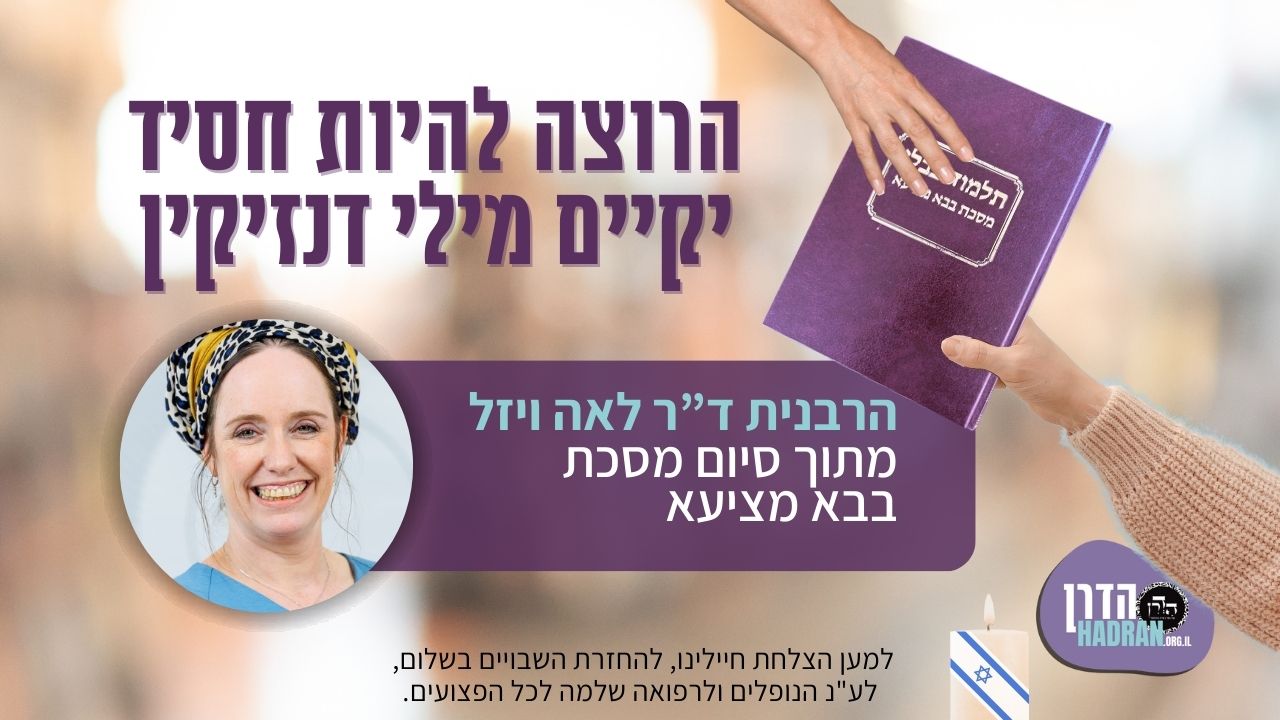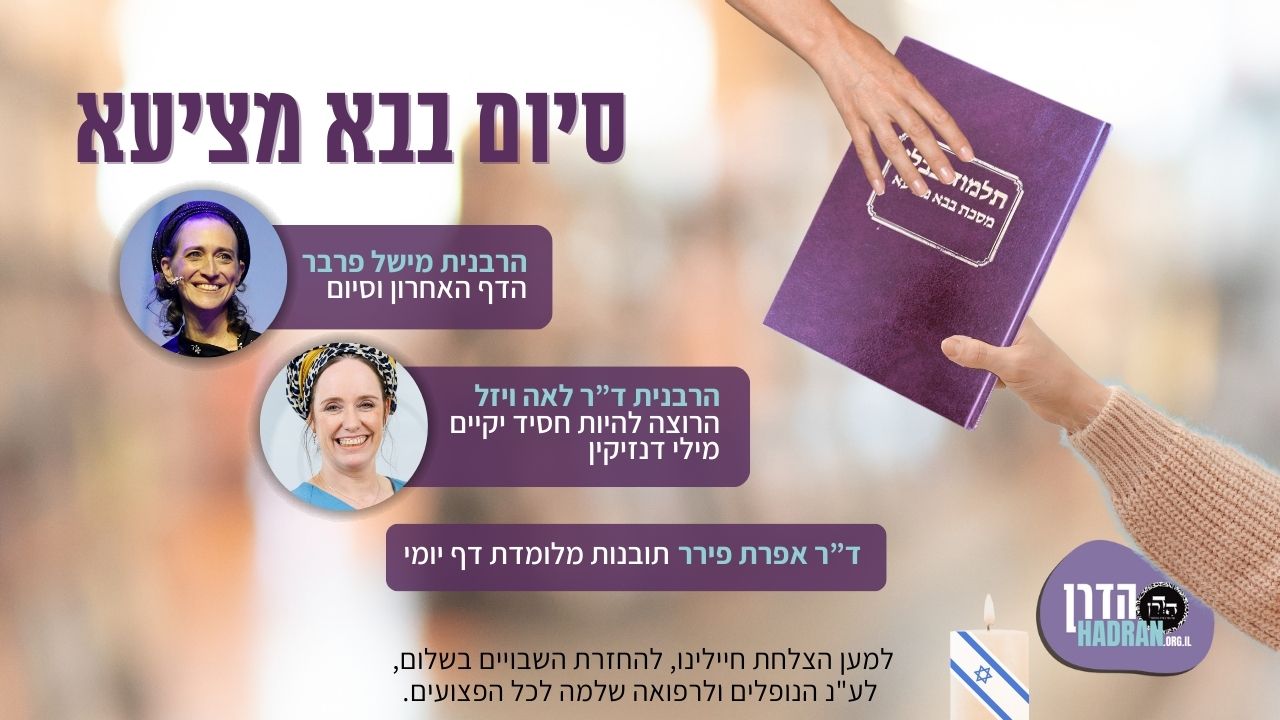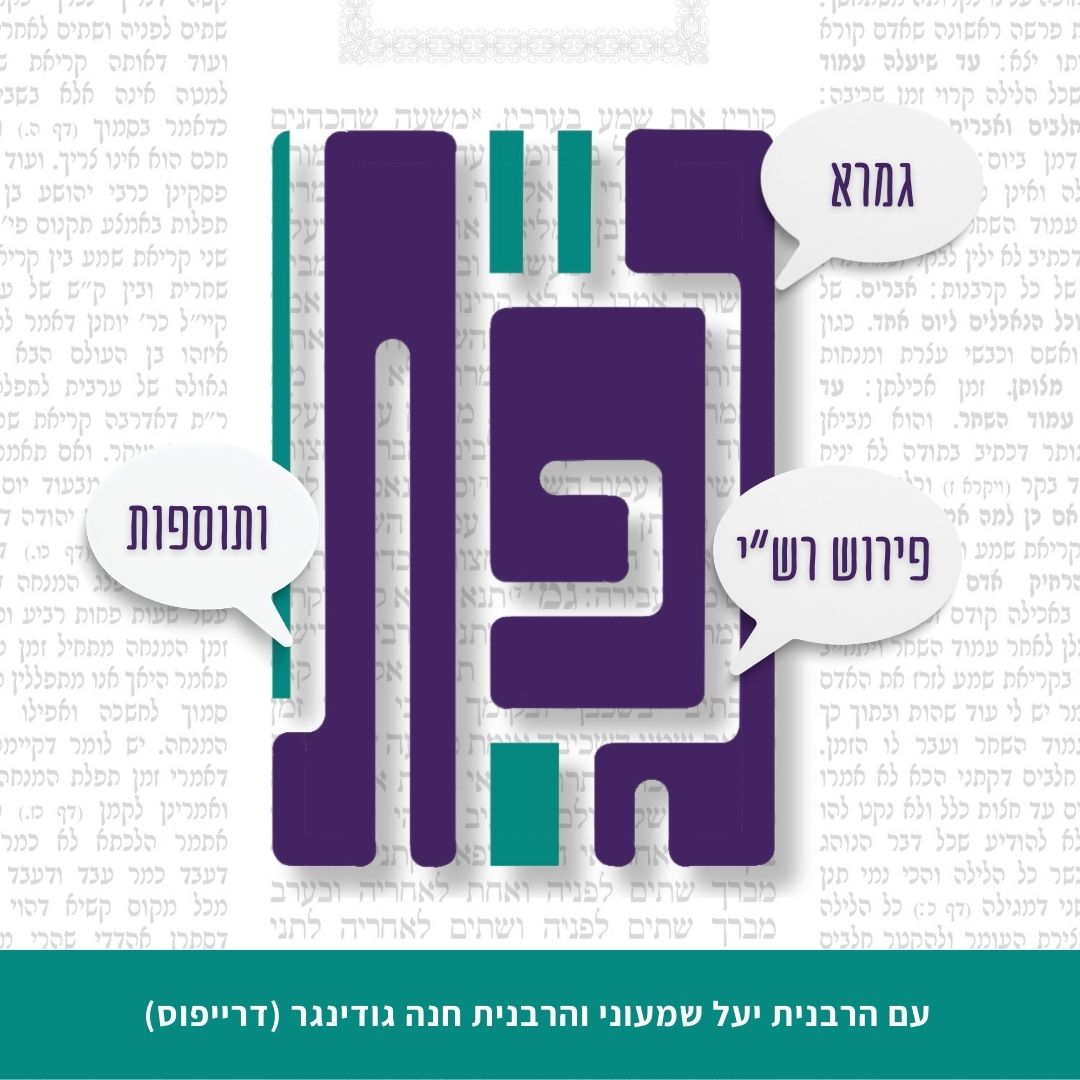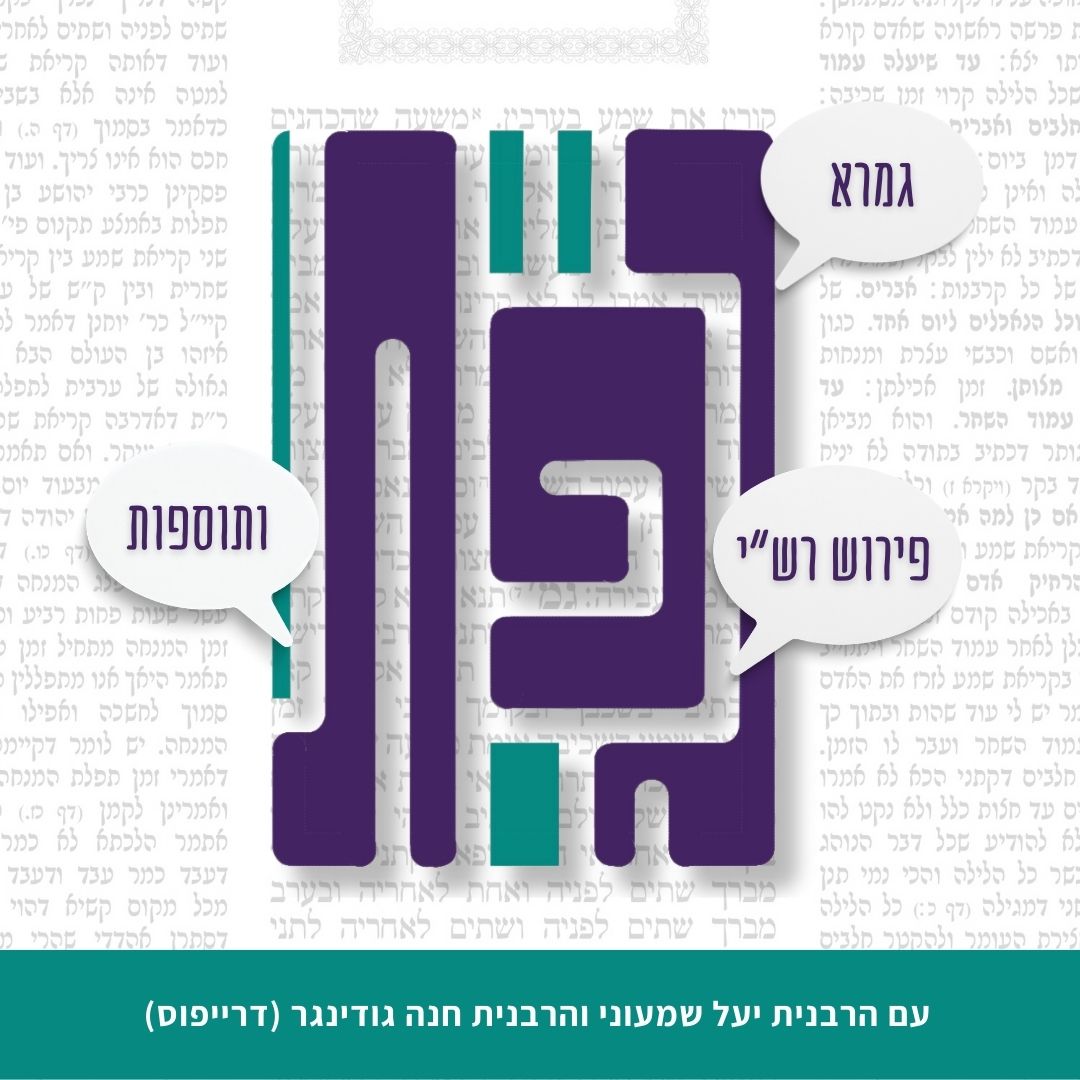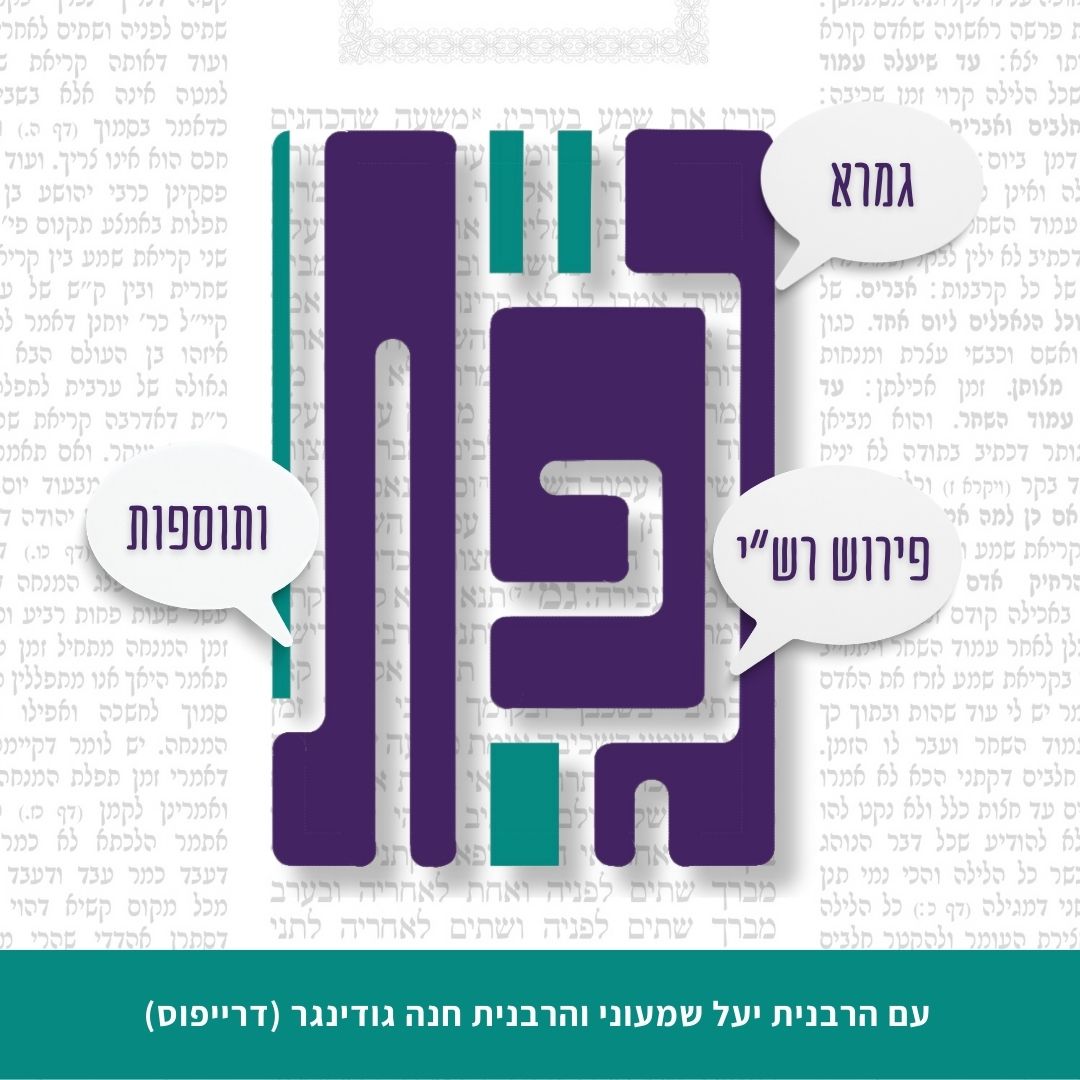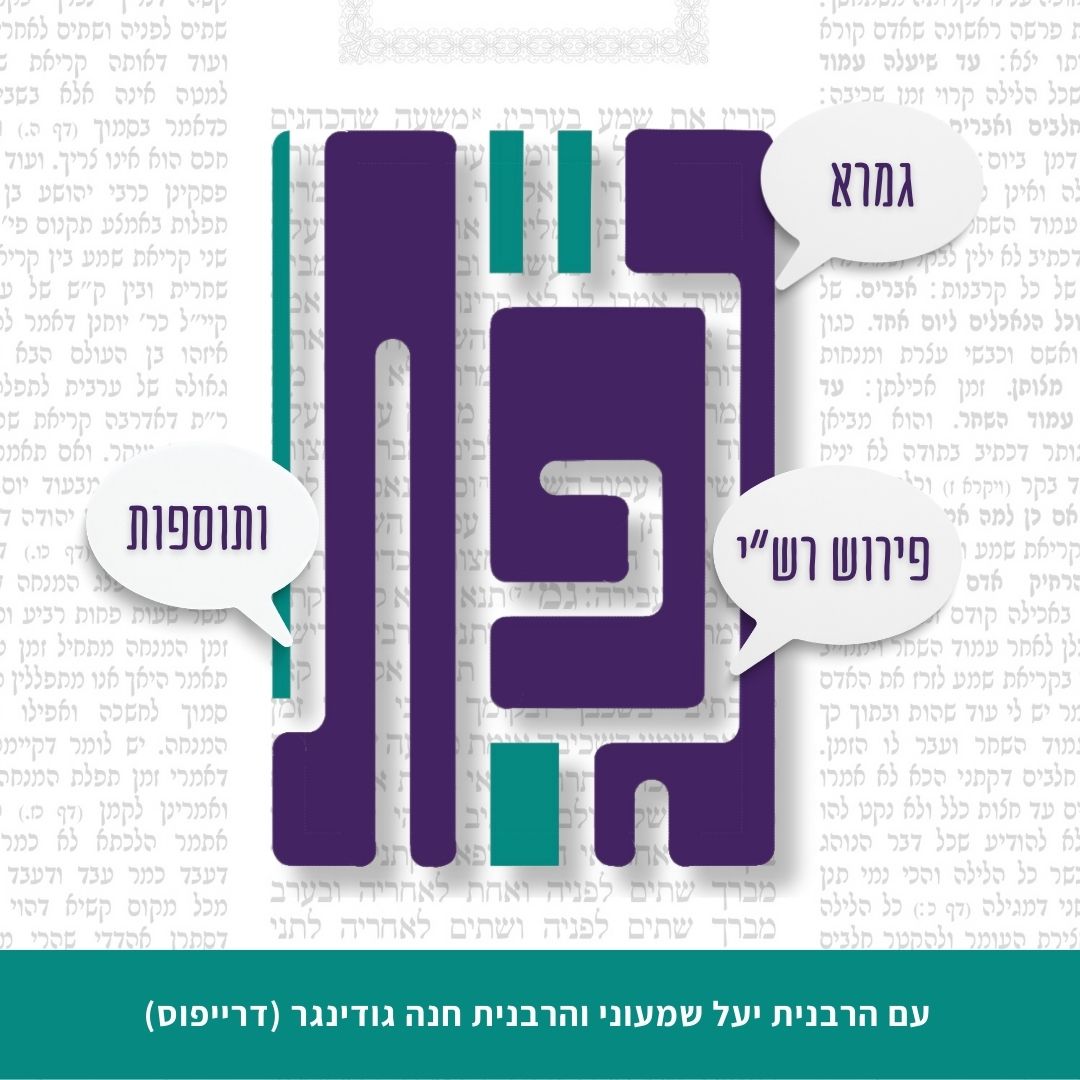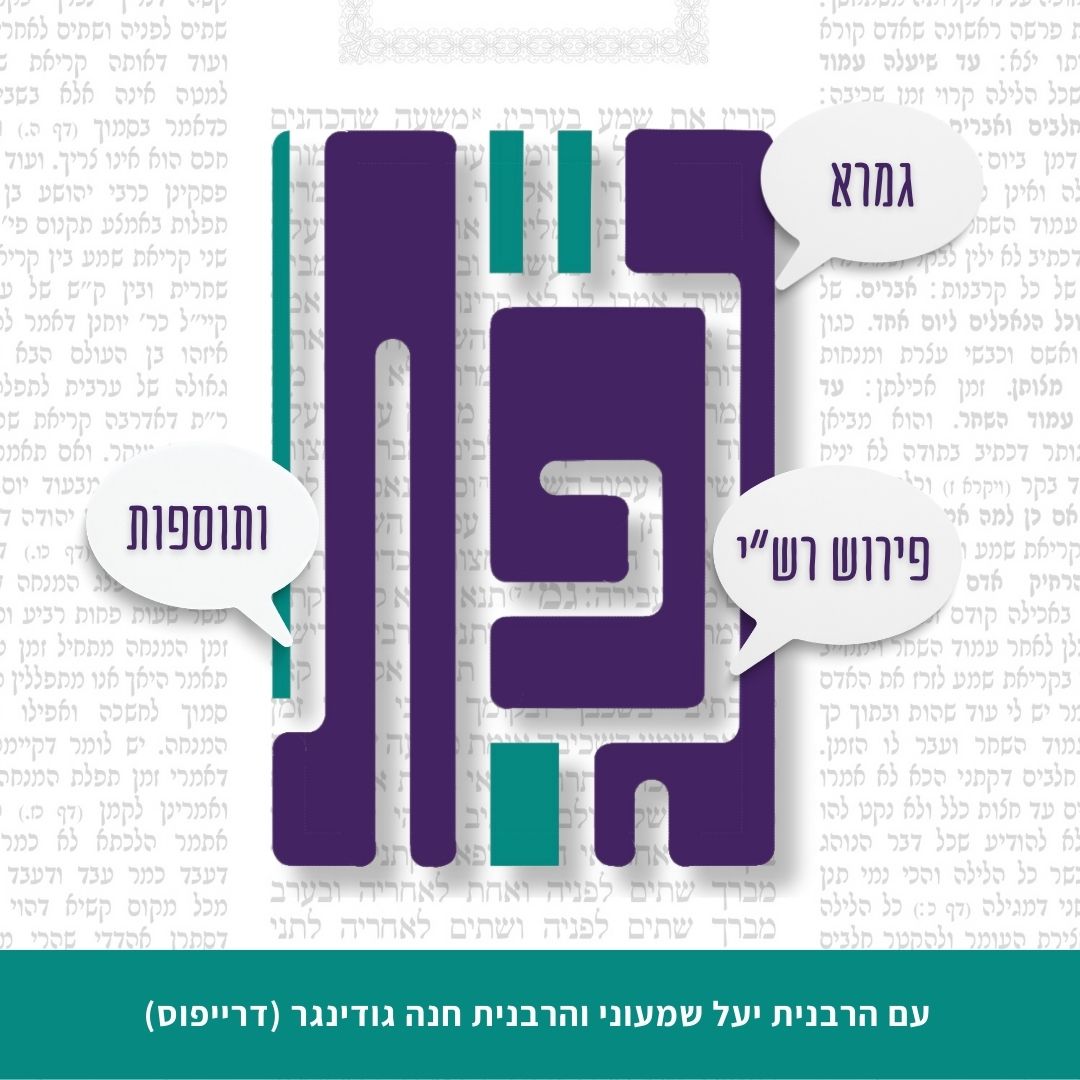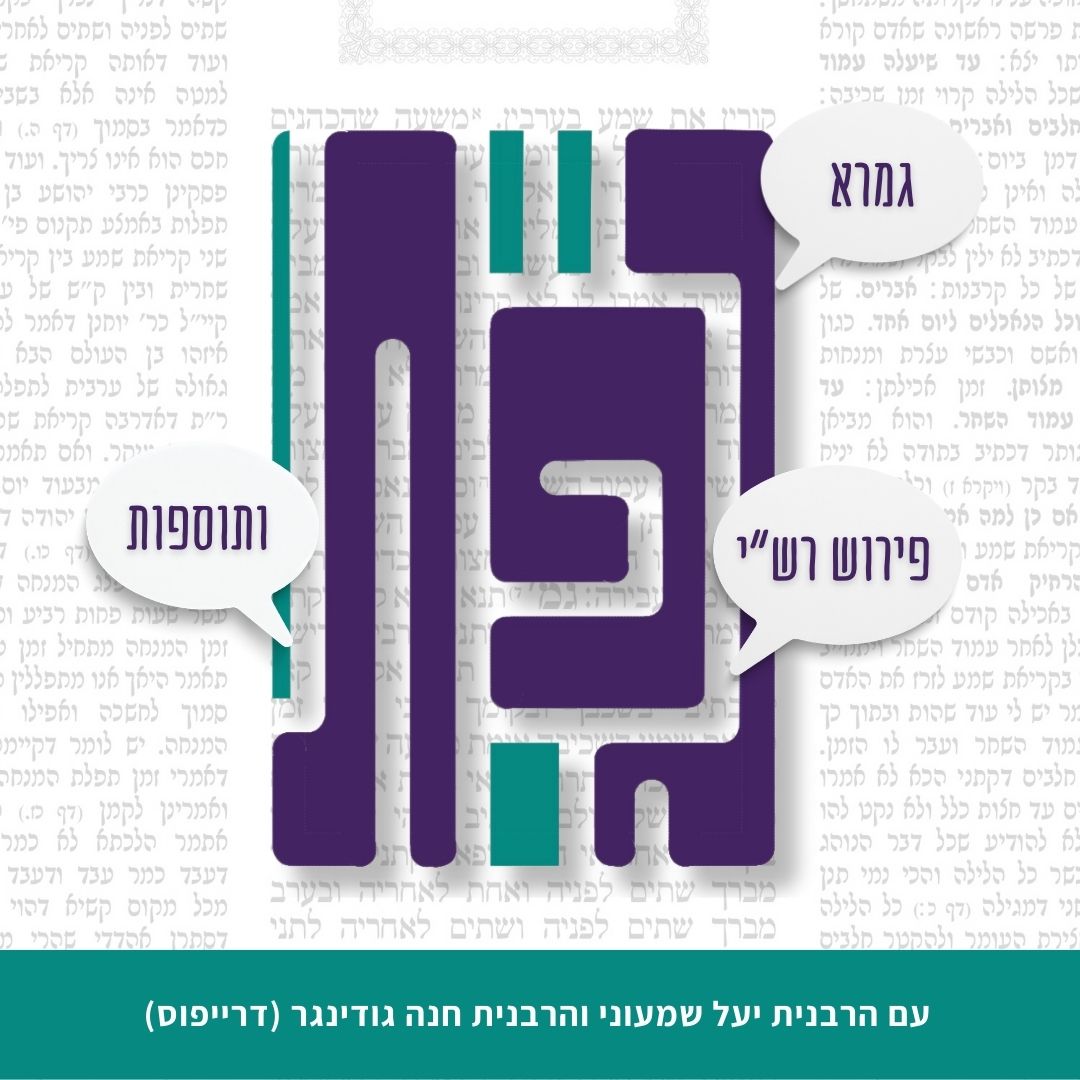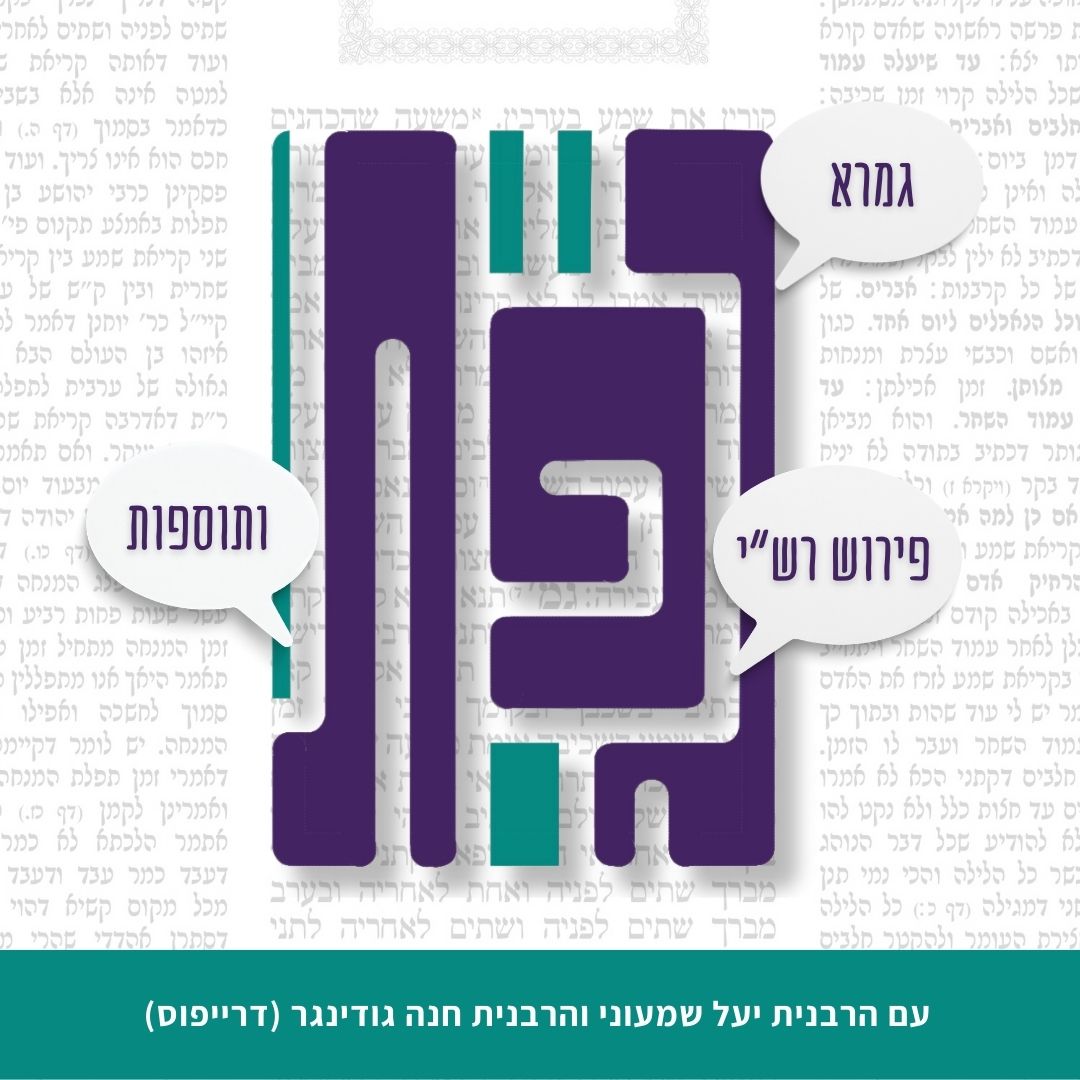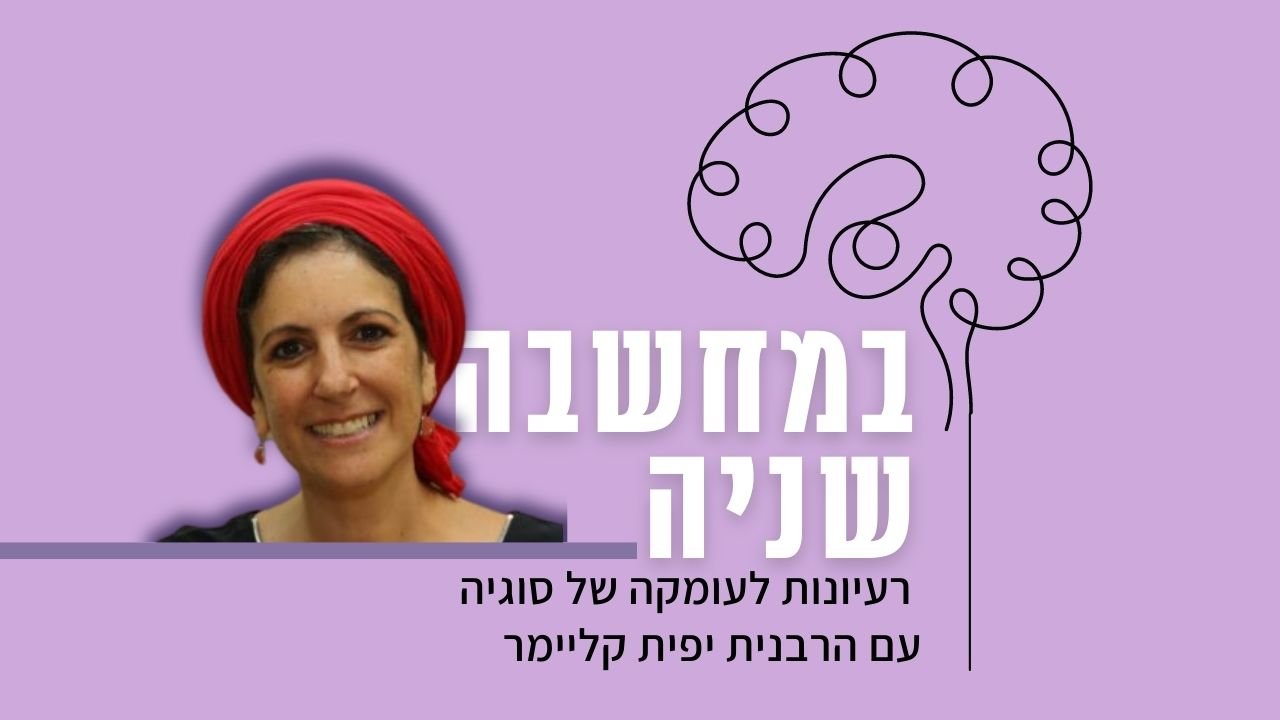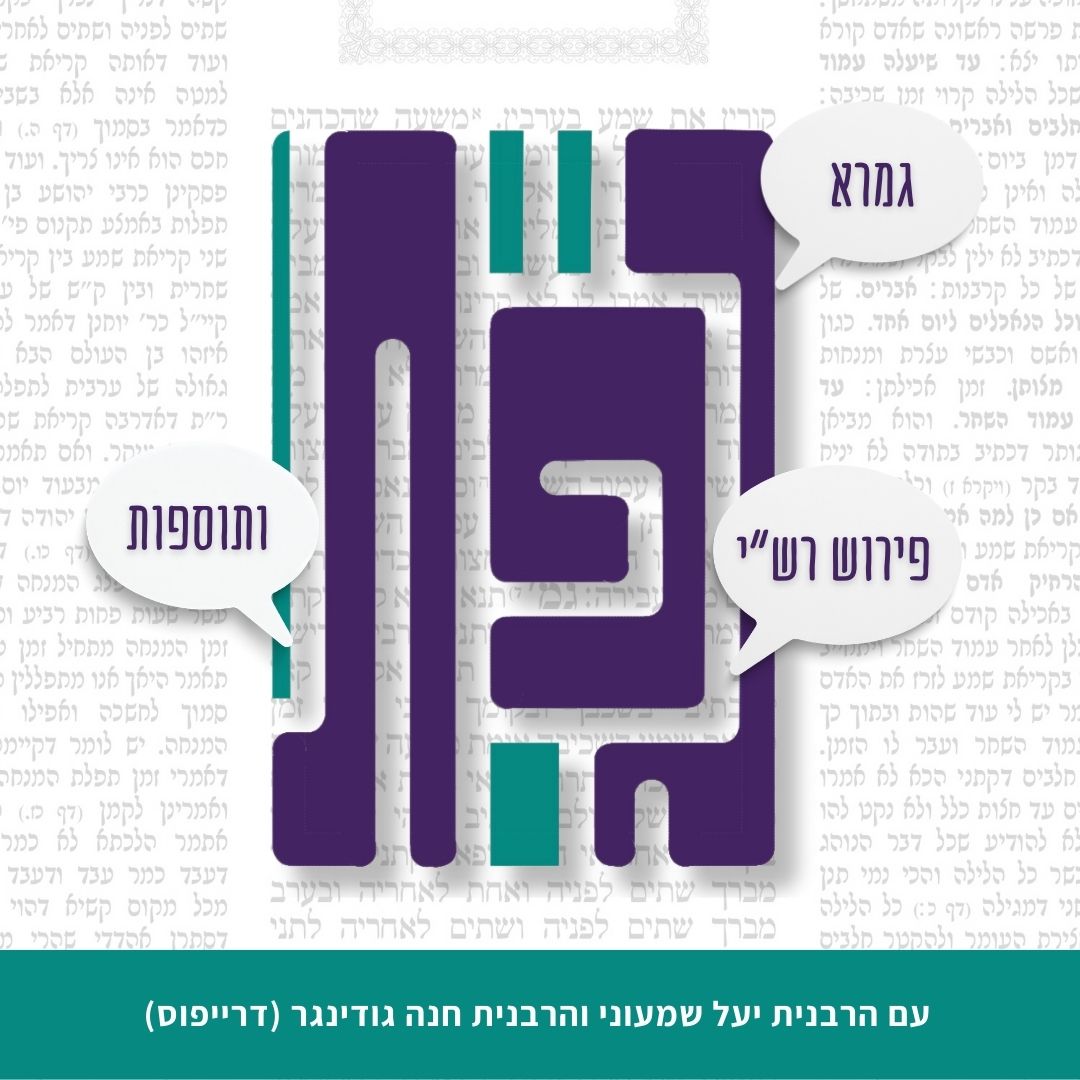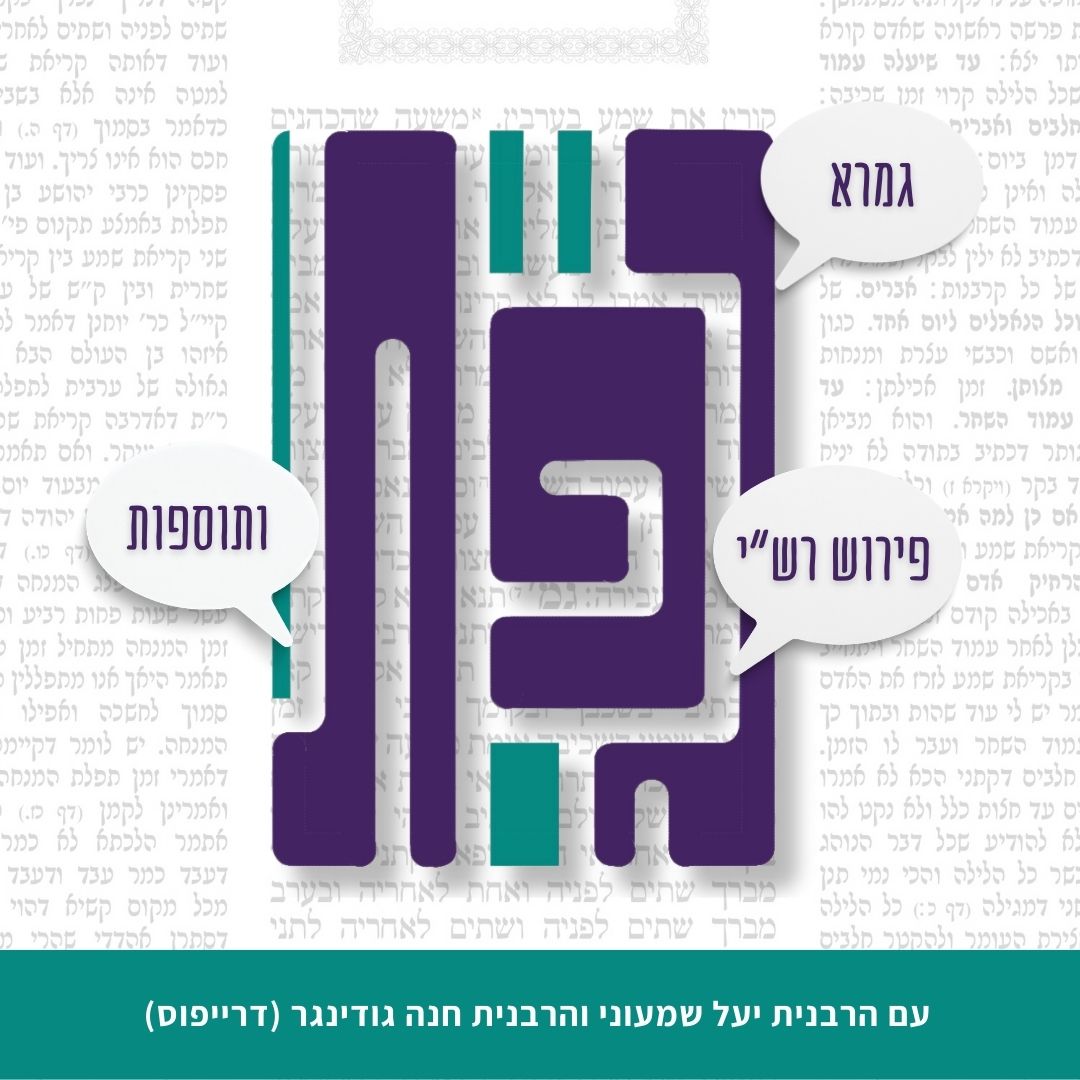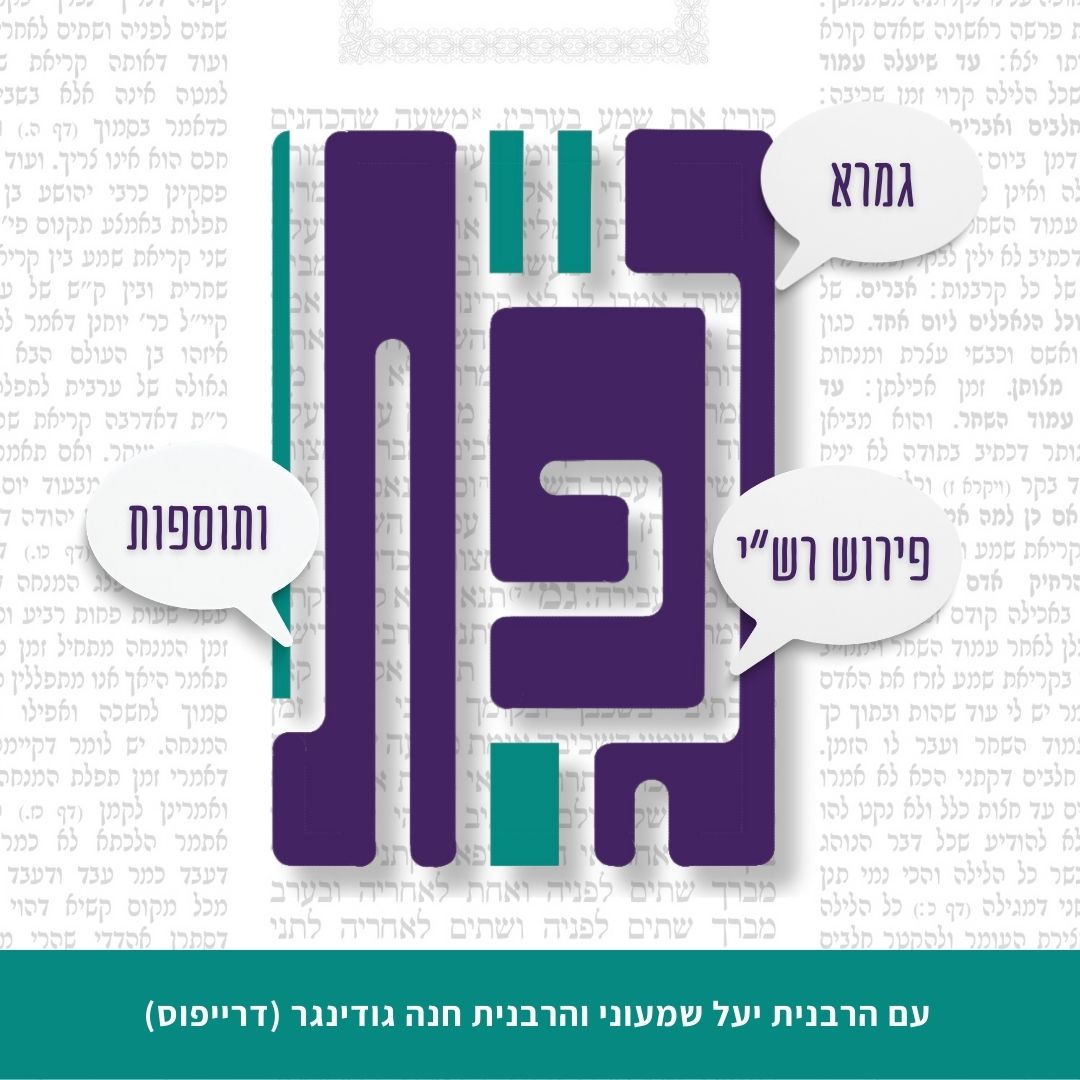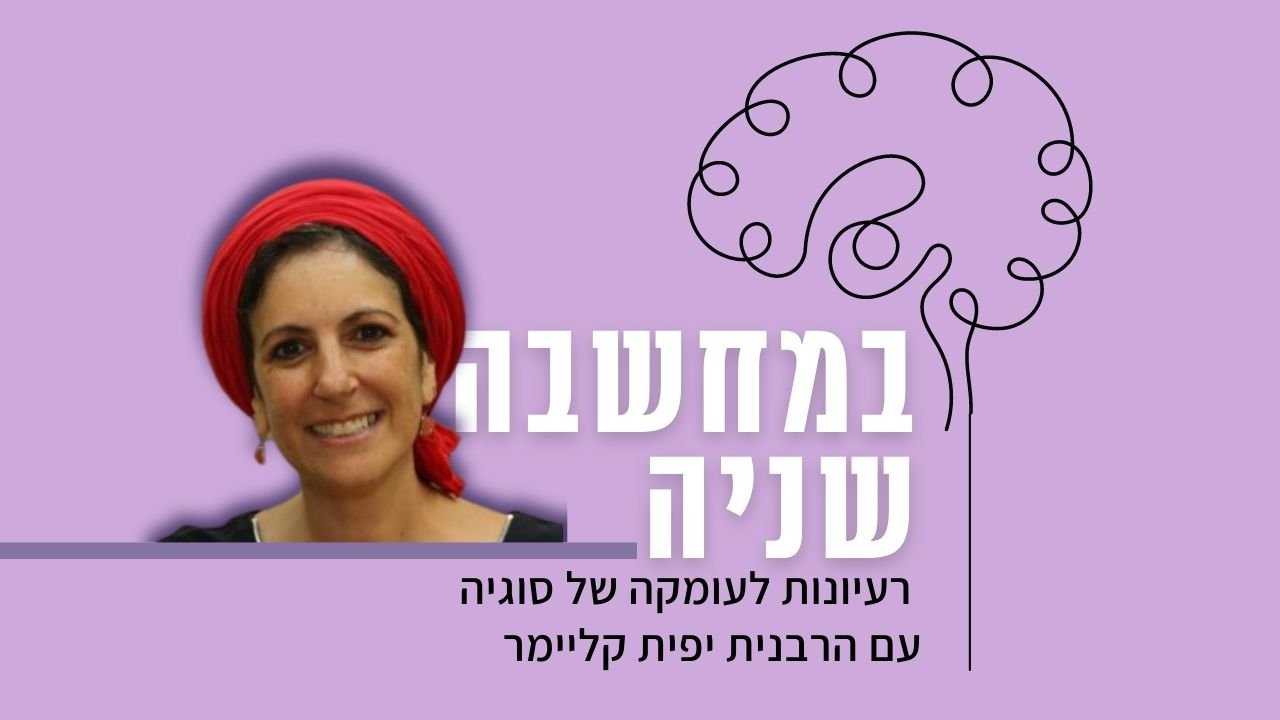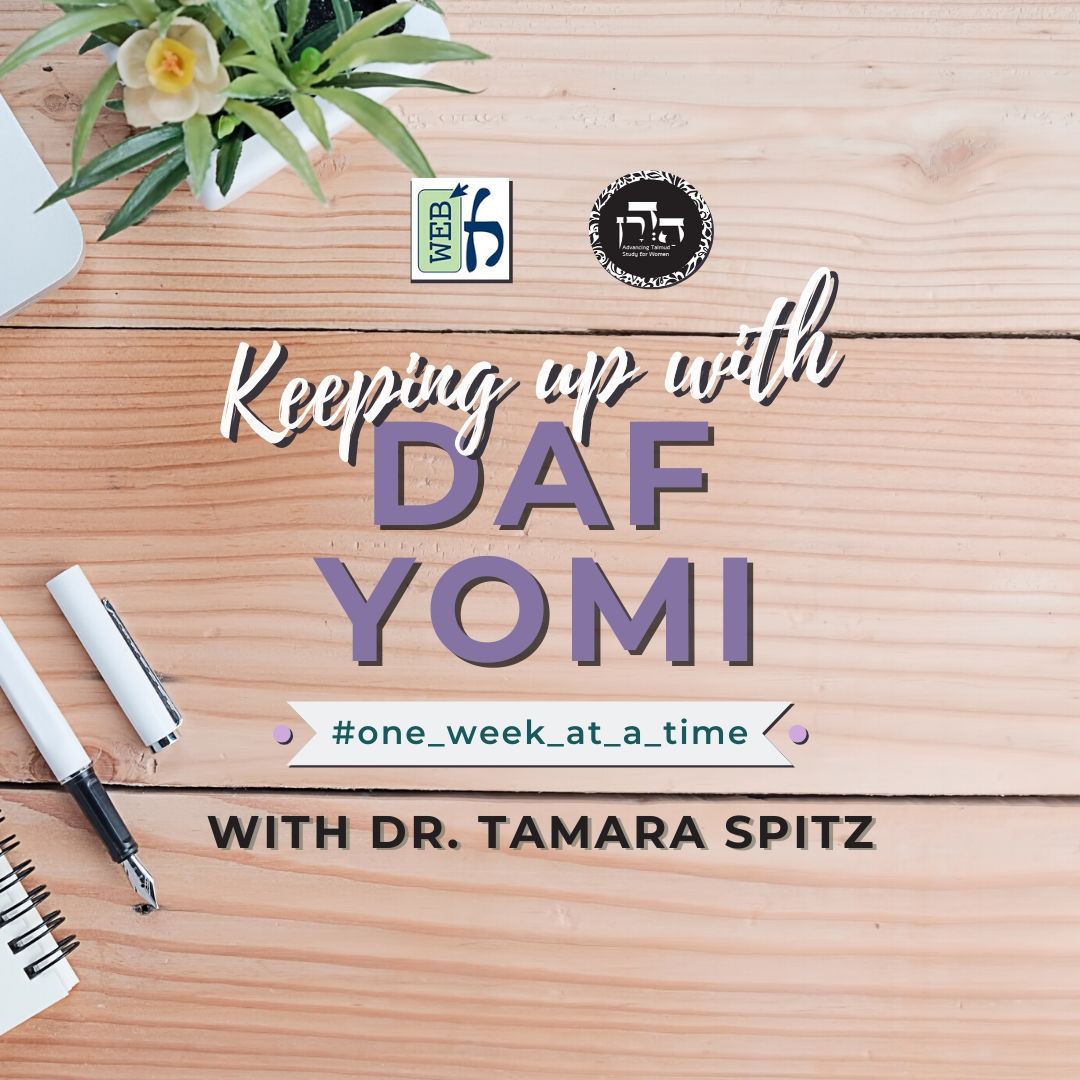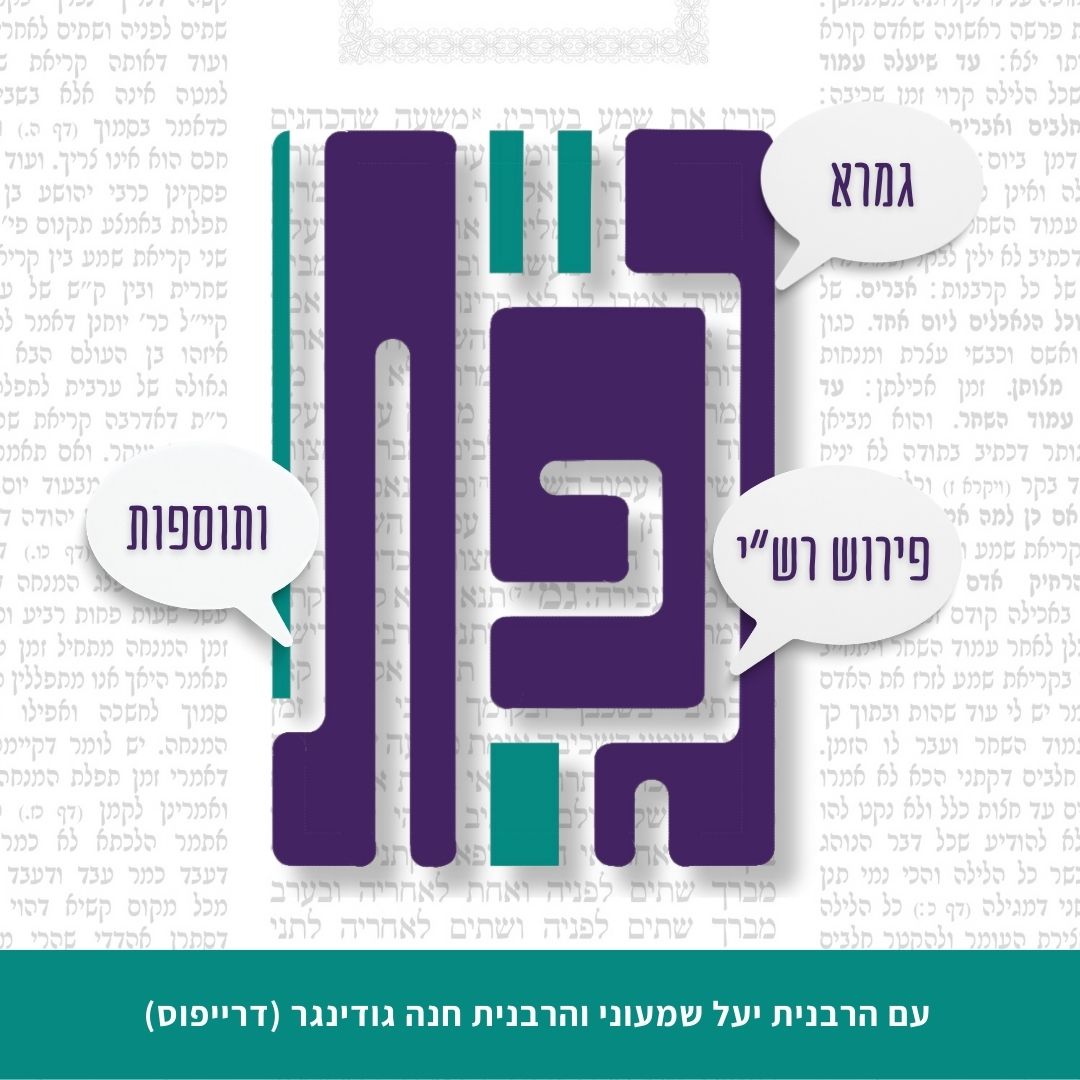רבי יוסי סובר שאי אפשר להרוויח מחפץ של מישהו אחר (אין אדם עושה סחורה בפרתו של חבירו). האם הוא חולק על חכמים גם במקרה במשנה הראשונה של הפרק לגבי השומר המשלם על הפקדון וזוכה לכפל אם יימצא הגנב? המשנה מעלה מקרים הנוגעים לספקות ממי נגנב הכסף או מי נתן איזה סכום כסף לשומר לשמור. הגמרא מעלה סתירות בין שני המקרים ובין משניות אחרות ועקרונות נוספים לגבי כסף המוטל בספק ומיישבת את ההבדלים.
הלימוד השבוע מוקדש לזכות ולשלום הַיְימׇנוֹט אֱמוּנָה בַּת באנצ’י (קָסָאוּ) בת 11 שנעלמה במקום מגוריה בצפת, לפני שנתיים, ביום ט”ז אדר תשפ”ד (25.2.24), ולא נודעו עקבותיה.
הלימוד השבוע מוקדש למען ביטחון המדינה, החיילים והאזרחים, ולמען חירותו של העם האיראני. שנזכה בקרוב שיתקיים בנו הפסוק: "לַיְּהוּדִים הָיְתָה אוֹרָה וְשִׂמְחָה וְשָׂשֹׂן וִיקָר”.
רוצה להקדיש שיעור?
כלים
הלימוד השבוע מוקדש לזכות ולשלום הַיְימׇנוֹט אֱמוּנָה בַּת באנצ’י (קָסָאוּ) בת 11 שנעלמה במקום מגוריה בצפת, לפני שנתיים, ביום ט”ז אדר תשפ”ד (25.2.24), ולא נודעו עקבותיה.
הלימוד השבוע מוקדש למען ביטחון המדינה, החיילים והאזרחים, ולמען חירותו של העם האיראני. שנזכה בקרוב שיתקיים בנו הפסוק: "לַיְּהוּדִים הָיְתָה אוֹרָה וְשִׂמְחָה וְשָׂשֹׂן וִיקָר”.
כלים
העמקה
רוצה להבין מה באמת קורה מתחת לפני השטח של הסוגיה?
שיעורים, פודקאסטים והרחבות של מיטב המורות שלנו יפתחו לך עוד זוויות וכיווני חשיבה.
חדשה בלימוד הגמרא?
זה הדף הראשון שלך? איזו התרגשות עצומה! יש לנו בדיוק את התכנים והכלים שיעזרו לך לעשות את הצעדים הראשונים ללמידה בקצב וברמה שלך, כך תוכלי להרגיש בנוח גם בתוך הסוגיות המורכבות ומאתגרות.
פסיפס הלומדות שלנו
גלי את קהילת הלומדות שלנו, מגוון נשים, רקעים וסיפורים. כולן חלק מתנועה ומסע מרגש ועוצמתי.
בבא מציעא לח
וְהָא טַעְמָא דְּרַבִּי יוֹסֵי מִשּׁוּם הֶפְסֵד הָרַמַּאי הוּא. אֶלָּא תַּרְוַיְיהוּ לְרַבָּנַן אִיצְטְרִיךְ, וְלֹא זוֹ אַף זוֹ קָתָנֵי.
The Gemara asks: But isn’t the reason for the opinion of Rabbi Yosei as he stated in the mishna: Due to the loss of the fraud? It is not due to the fact that the vessel will not remain intact. Consequently, there is no reason to believe that Rabbi Yosei would concede to the Rabbis in the instance where money was deposited. Rather, both of the cases are necessary according to the Rabbis. And although the first case could have been inferred from the second case, the tanna teaches the mishna employing the style of: Not only this but also that, i.e., the mishna began with an obvious example and continued with a more novel one.
מַתְנִי׳ הַמַּפְקִיד פֵּירוֹת אֵצֶל חֲבֵירוֹ, אֲפִילּוּ הֵן אֲבוּדִין – לֹא יִגַּע בָּהֶן. רַבָּן שִׁמְעוֹן בֶּן גַּמְלִיאֵל אוֹמֵר: מוֹכְרָן בִּפְנֵי בֵּית דִּין, מִפְּנֵי שֶׁהוּא כְּמֵשִׁיב אֲבֵידָה לַבְּעָלִים.
MISHNA: In the case of one who deposits produce with another, even if it is lost due to spoilage or vermin, the bailee may not touch it, as it is not his. Rabban Shimon ben Gamliel says: He sells it before the court, as by doing so he is like one returning a lost item to the owner, since through its sale he prevents the owner from losing the value of his produce.
גְּמָ׳ מַאי טַעְמָא? אָמַר רַב כָּהֲנָא: אָדָם רוֹצֶה בְּקַב שֶׁלּוֹ מִתִּשְׁעָה קַבִּים שֶׁל חֲבֵירוֹ. וְרַב נַחְמָן בַּר יִצְחָק אָמַר: חָיְישִׁינַן שֶׁמָּא עֲשָׂאָן הַמַּפְקִיד תְּרוּמָה וּמַעֲשֵׂר עַל מָקוֹם אַחֵר.
GEMARA: What is the reason that the first tanna said that the bailee should not touch the produce? Rav Kahana says that it is based on the principle: A person prefers a kav of his own produce to nine kav of another’s produce. Consequently, despite the spoilage, the owner prefers that the bailee not touch the produce. Rav Naḥman bar Yitzḥak says: We are concerned that perhaps the one who deposited the produce rendered it teruma and tithe for produce in another place, resulting in the buyer consuming produce that is teruma and tithe inappropriately.
מֵיתִיבִי: הַמַּפְקִיד פֵּירוֹת אֵצֶל חֲבֵירוֹ, הֲרֵי זֶה לֹא יִגַּע בָּהֶן. לְפִיכָךְ בַּעַל הַבַּיִת עוֹשֶׂה אוֹתָן תְּרוּמָה וּמַעֲשֵׂר עַל מָקוֹם אַחֵר. בִּשְׁלָמָא לְרַב כָּהֲנָא, הַיְינוּ דְּקָתָנֵי ״לְפִיכָךְ״.
The Gemara raises an objection from a baraita: In the case of one who deposits produce with another, the bailee may not touch it, and therefore the owner may render it teruma or tithe for produce in another place. Granted, according to Rav Kahana, this is the reason that the tanna teaches: And therefore the owner renders them teruma. The concern that the owner may render the produce teruma and tithe is not the reason why the bailee may not sell it, and the halakha that the owner may render the produce teruma and tithe results from the halakha that the bailee may not sell it.
אֶלָּא לְרַב נַחְמָן בַּר יִצְחָק מַאי ״לְפִיכָךְ״? הָכִי קָאָמַר: הַשְׁתָּא דַּאֲמוּר רַבָּנַן לָא נְזַבֵּין, דְּחָיְישִׁינַן – לְפִיכָךְ בַּעַל הַבַּיִת עוֹשֶׂה אוֹתָן תְּרוּמָה וּמַעֲשֵׂר עַל מָקוֹם אַחֵר.
But according to Rav Naḥman bar Yitzḥak, what is the meaning of the term therefore? According to his explanation, the fact that the owner may render the produce teruma and tithe is the very reason why the bailee may not sell the produce. The Gemara explains: This is what the tanna is saying: Now that the Sages said that the bailee may not sell the produce due to the fact that we are concerned that perhaps the owner had rendered it teruma, the owner can be confident that the produce is still in the possession of the bailee. Therefore, the owner may render it teruma and tithe for produce in another place even ab initio.
אָמַר רַבָּה בַּר בַּר חָנָה אָמַר רַבִּי יוֹחָנָן: מַחֲלוֹקֶת בִּכְדֵי חֶסְרוֹנָן, אֲבָל יוֹתֵר מִכְּדֵי חֶסְרוֹנָן – דִּבְרֵי הַכֹּל מוֹכְרָן בְּבֵית דִּין.
§ Rabba bar bar Ḥana says that Rabbi Yoḥanan says: The dispute in the mishna is in a case where the produce deteriorates at its standard rate of deterioration. But if the produce deteriorates at a rate greater than its standard rate of deterioration, everyone agrees that the bailee sells it before the court.
אַדְּרַב נַחְמָן בַּר יִצְחָק – וַדַּאי פְּלִיגָא. אַדְּרַב כָּהֲנָא מִי לֵימָא פְּלִיגָא? כִּי קָאָמַר רַב כָּהֲנָא – בִּכְדֵי חֶסְרוֹנָן קָאָמַר.
The Gemara comments: Rabbi Yoḥanan certainly disagrees with the opinion of Rav Naḥman bar Yitzḥak, as the concern that the owner might have rendered the produce teruma or tithe applies regardless of the rate of deterioration. The Gemara asks: Shall we say that Rabbi Yoḥanan disagrees with the opinion of Rav Kahana? The Gemara answers: When Rav Kahana says that one prefers his own produce, it was in a case where the produce deteriorates at its standard rate of deterioration that he says it. When the rate of deterioration is accelerated, he would agree that the bailee sells the produce.
וְהָא רוֹצֶה בְּקַב שֶׁלּוֹ מִתִּשְׁעָה קַבִּין שֶׁל חֲבֵירוֹ קָאָמַר! גּוּזְמָא בְּעָלְמָא.
The Gemara asks: But didn’t Rav Kahana say: A person prefers a kav of his own produce to nine kav of another’s produce? This indicates that even if the rate of deterioration was accelerated, one prefers his own produce, as in the case he describes eight-ninths of the produce is lost. The Gemara answers: This expression is merely an exaggeration, and actually one prefers his own produce only when its rate of deterioration is standard.
מֵיתִיבִי: לְפִיכָךְ בַּעַל הַבַּיִת עוֹשֶׂה אוֹתָן תְּרוּמָה וּמַעֲשֵׂר עַל מָקוֹם אַחֵר. וְלֵיחוּשׁ דִּלְמָא הֲווֹ לְהוּ יוֹתֵר מִכְּדֵי חֶסְרוֹנָן, וְזַבְּנִינְהוּ – וְקָא אָכֵיל טְבָלִים! יוֹתֵר מִכְּדֵי חֶסְרוֹנָן לָא שְׁכִיחַ.
The Gemara raises an objection from a baraita: Therefore, the owner renders it teruma or tithe for produce in another place. And let the owner be concerned that perhaps the produce deteriorated at a rate greater than its standard rate of deterioration, and the bailee sold it, in which case the owner would be eating untithed produce. The Gemara answers: Deterioration at a rate greater than its standard rate of deterioration is uncommon, and the Sages do not issue decrees for uncommon cases.
וְאִי מִשְׁתַּכְחִי מַאי? מְזַבְּנִינַן לְהוּ? וְלֵיחוּשׁ שֶׁמָּא עֲשָׂאָן בַּעַל הַבַּיִת תְּרוּמָה וּמַעֲשֵׂר עַל מָקוֹם אַחֵר! כִּי מְזַבְּנִינַן נָמֵי – לְכֹהֲנִים בִּדְמֵי תְרוּמָה מְזַבְּנִינַן לְהוּ.
The Gemara asks: And if it is found that more of the produce is missing than would be lost according to the standard rate of deterioration, what should be done? According to the opinion of Rabbi Yoḥanan, do we sell it? But let us be concerned that perhaps the owner already rendered this produce teruma and tithe for produce in another place. The Gemara answers: Even when we sell the produce, it is to priests at the price of teruma that we sell it. Consequently, even if the owner rendered it teruma, it is consumed by priests and therefore there is no concern.
וּלְרַב נַחְמָן בַּר יִצְחָק נָמֵי נְזַבְּנִינְהוּ לְכֹהֲנִים בִּדְמֵי תְרוּמָה? בְּהָא פְּלִיגִי, דְּרַבָּה בַּר בַּר חַנָּה סְבַר: יוֹתֵר מִכְּדֵי חֶסְרוֹנָן לָא שְׁכִיחַ מִידֵּי, וְכִי מִשְׁתְּכַח, לְקַמֵּיהּ הוּא דְּהָוְיָא יָתֵיר מִכְּדֵי חֶסְרוֹנָן. אִי עָבֵיד לְהוּ בַּעַל הַבַּיִת תְּרוּמָה וּמַעֲשֵׂר עַל מָקוֹם אַחֵר, מִקַּמֵּיה דְּהָווּ לְהוּ יוֹתֵר מִכְּדֵי חֶסְרוֹנָן עָבֵיד לְהוּ. הִלְכָּךְ, כִּי הָווּ לְהוּ יוֹתֵר מִכְּדֵי חֶסְרוֹנָן – נְזַבְּנִינְהוּ לְכֹהֲנִים בִּדְמֵי תְרוּמָה.
The Gemara asks: And according to Rav Naḥman bar Yitzḥak as well, since the concern is that perhaps the owner rendered the produce teruma, let the bailee sell the produce to priests at the price of teruma. The Gemara answers: It is with regard to this that they disagree, as Rabba bar bar Ḥana holds: Deterioration at a rate greater than its standard rate of deterioration is not common at all. And when it occurs that the produce deteriorates at the greater rate, it is only from now on that it is assumed that it became deteriorated at a rate greater than its standard rate of deterioration. Therefore, if the owner had rendered the produce teruma and tithe for produce in another place, it is assumed that it was before it deteriorated at a rate greater than its standard rate of deterioration that he did it. Therefore, when the produce deteriorated at a rate greater than its standard rate of deterioration, the bailee should sell the produce to priests at the price of teruma, as it may be teruma.
וְרַב נַחְמָן בַּר יִצְחָק סָבַר: יָתֵר מִכְּדֵי חֶסְרוֹנָן מִשְׁכָּח שְׁכִיחַ וְכִי הָווּ לְהוּ – לְאַלְתַּר הוּא דְּהָווּ לְהוּ. וְאִי אָמְרַתְּ נְזַבְּנִינְהוּ – זִימְנִין דְּקָדֵים וּמְזַבֵּין לְהוּ, וְכִי עָבֵיד לְהוּ בַּעַל הַבַּיִת תְּרוּמָה וּמַעֲשֵׂר עַל מְקוֹם אַחֵר – לָא יָדַע דִּ[מְ]זַבְּנָא, וְקָא אָכֵיל טְבָלִים.
And Rav Naḥman bar Yitzḥak holds: Deterioration at a rate greater than its standard rate of deterioration is common. And when the produce became deteriorated at a rate greater than its standard rate of deterioration, it may be immediately that it became deteriorated to that extent. And if you say: Let us sell it, the concern is that at times the bailee will sell it early. And when the owner renders the produce teruma and tithe for produce in another place, he does not know that the bailee already sold the produce, and the owner eats untithed produce.
מֵיתִיבִי: הַמַּפְקִיד פֵּירוֹת אֵצֶל חֲבֵירוֹ וְהִרְקִיבוּ, יַיִן וְהֶחְמִיץ, שֶׁמֶן וְהִבְאִישׁ, דְּבַשׁ וְהִדְבִּישׁ – הֲרֵי זֶה לֹא יִגַּע בָּהֶן, דִּבְרֵי רַבִּי מֵאִיר. וַחֲכָמִים אוֹמְרִים: עוֹשֶׂה לָהֶם תַּקָּנָה, וּמוֹכְרָן בְּבֵית דִּין. וּכְשֶׁהוּא מוֹכְרָן – מוֹכְרָן לַאֲחֵרִים וְאֵינוֹ מוֹכְרָן לְעַצְמוֹ.
The Gemara raises an objection from a baraita: In the case of one who deposits produce with another and it rotted, wine and it fermented, oil and it putrefied, honey and it spoiled, the bailee may not touch them; this is the statement of Rabbi Meir. And the Rabbis say: He effects a remedy for these items and sells them in court. The baraita adds: And when he sells them, he sells them to others and does not sell them to himself, even for the same price, so no one will suspect that he bought it at a discount.
כַּיּוֹצֵא בּוֹ: גַּבָּאֵי צְדָקָה בִּזְמַן שֶׁאֵין לָהֶם עֲנִיִּים לְחַלֵּק – פּוֹרְטִין לַאֲחֵרִים, וְאֵין פּוֹרְטִין לְעַצְמָן. גַּבָּאֵי תַמְחוּי בִּזְמַן שֶׁאֵין לָהֶם עֲנִיִּים לְחַלֵּק – מוֹכְרִין לַאֲחֵרִים, וְאֵין מוֹכְרִים לְעַצְמָן.
On a similar note, with regard to charity collectors, when they do not have poor people to whom to distribute charity, they change copper perutot that they collected for more valuable silver coins only for other people, but they do not change the coins for themselves, to avoid suspicion. If collectors for the charity plate collected ready-made food for the poor, at a time where there are no poor people to whom to distribute the food, they sell the food only to others but do not sell the food to themselves.
קָתָנֵי מִיהַת פֵּירוֹת וְהִרְקִיבוּ, מַאי לָאו אֲפִילּוּ יָתֵר מִכְּדֵי חֶסְרוֹנָן? לֹא, בִּכְדֵי חֶסְרוֹנָן. וְהָא יַיִן וְהֶחְמִיץ, שֶׁמֶן וְהִבְאִישׁ, דְּבַשׁ וְהִדְבִּישׁ – דְּיָתֵר מִכְּדֵי חֶסְרוֹנָן נִינְהוּ! שָׁאנֵי הָנֵי כֵּיוָן דְּקָם – קָם.
In any event, it is taught: Produce and it rotted. What, is it not referring even to a case where they all rotted at a rate greater than its standard rate of deterioration? The Gemara rejects this: No; it is referring to a case where they deteriorated at their standard rate of deterioration. The Gemara asks: But aren’t the cases of wine and it fermented, oil and it putrefied, and honey and it spoiled cases where these items deteriorated at a rate greater than their standard rate of deterioration, as there is a significant difference in the price of wine before and after fermentation, and in the price of oil before and after putrefaction? The Gemara rejects that proof: Those cases are different. Once they become spoiled, they remain spoiled but do not continue to deteriorate. Therefore, although their deterioration was significant, there is nothing gained by selling it.
שֶׁמֶן וְהִבְאִישׁ, דְּבַשׁ וְהִדְבִּישׁ –
On a related note, the Gemara asks: Concerning the cases of oil and it putrefied, honey and it spoiled,
לְמַאי חֲזוּ? שֶׁמֶן חֲזֵי לְגִלְדָּאֵי, דְּבַשׁ לִכְתִישָׁא דְגַמְלֵי.
for what use are they fit? According to the Rabbis, one sells them in court. Apparently, they must have some value. The Gemara answers: Oil is fit for tanners who would coat the hides with oil even if it had a foul odor. Honey it fit as a salve for a wound on the back of camels.
וַחֲכָמִים אוֹמְרִים: עוֹשֶׂה לָהֶם תַּקָּנָה וּמוֹכְרָן בְּבֵית דִּין. מַאי תַּקַּנְתָּא עָבֵיד לְהוּ? אָמַר רַב אָשֵׁי: לְקַנְקַנִּים.
It is taught in the baraita: And the Rabbis say that the bailee effects a remedy for the spoiled products and sells them in court. The Gemara asks: What remedy does he effect for those products? Rav Ashi said: It is a remedy for the casks. Although the contents of the barrel are irreversibly spoiled, leaving it in the barrels will ruin the barrels.
בְּמַאי קָא מִיפַּלְגִי? דְּמָר סָבַר: לְהֶפְסֵד מְרוּבֶּה – חָשְׁשׁוּ, לְהֶפְסֵד מוּעָט – לֹא חָשְׁשׁוּ. וּמָר סָבַר: אֲפִילּוּ לְהֶפְסֵד מוּעָט נָמֵי חָשְׁשׁוּ.
The Gemara asks: Since Rabbi Meir agrees that when there is deterioration at a rate greater than its standard rate of deterioration, the bailee should sell the deposit, with regard to what issue do Rabbi Meir and the Rabbis disagree? The Gemara answers: The dispute is that one Sage, Rabbi Meir, holds: The Sages were concerned for a significant loss, but the Sages were not concerned for an insignificant loss, like damage to the barrels. And one Sage, the Rabbis, holds: The Sages were concerned even for an insignificant loss.
רַבָּן שִׁמְעוֹן בֶּן גַּמְלִיאֵל אוֹמֵר יִמְכְּרֵם בְּבֵית דִּין, מִפְּנֵי שֶׁהוּא כְּמֵשִׁיב אֲבֵידָה לִבְעָלִים. אִתְּמַר, רַבִּי אַבָּא בְּרַבִּי יַעֲקֹב אָמַר רַבִּי יוֹחָנָן: הֲלָכָה כְּרַבָּן שִׁמְעוֹן בֶּן גַּמְלִיאֵל. וְרָבָא אָמַר רַב נַחְמָן: הֲלָכָה כְּדִבְרֵי חֲכָמִים.
§ The mishna teaches that Rabban Shimon ben Gamliel says: He sells it before the court, due to the fact that in doing so he is like one returning a lost item to the owner. It was stated that Rabbi Abba, son of Rabbi Ya’akov, says that Rabbi Yoḥanan says: The halakha is in accordance with the opinion of Rabban Shimon ben Gamliel. And Rava says that Rav Naḥman says: The halakha is in accordance with the statement of the Rabbis.
וְהָא אַמְרַהּ רַבִּי יוֹחָנָן חֲדָא זִמְנָא, דְּאָמַר רַבָּה בַּר בַּר חָנָה אָמַר רַבִּי יוֹחָנָן: כׇּל מָקוֹם שֶׁשָּׁנָה רַבָּן שִׁמְעוֹן בֶּן גַּמְלִיאֵל בְּמִשְׁנָתֵינוּ הֲלָכָה כְּמוֹתוֹ, חוּץ מֵעָרֵב, וְצַיְדָן, וּרְאָיָה אַחֲרוֹנָה.
The Gemara asks: But why is it necessary for Rabbi Yoḥanan to issue that ruling specifically in this case? Didn’t Rabbi Yoḥanan already say one other time that in general the halakha is in accordance with the opinion of Rabban Shimon ben Gamliel? As Rabba bar bar Ḥana says that Rabbi Yoḥanan said: Every place where Rabban Shimon ben Gamliel taught a ruling in our mishna, the halakha is in accordance with his opinion, except for the following three cases: The responsibility of the guarantor (Bava Batra 173b), and the incident that occurred in the city of Tzaidan (Gittin 74a), and the dispute with regard to evidence in the final disagreement (Sanhedrin 31a). By inference, in all other cases, Rabbi Yoḥanan holds that the halakha is in accordance with his opinion.
אָמוֹרָאֵי נִינְהוּ וְאַלִּיבָּא דְּרַבִּי יוֹחָנָן.
The Gemara answers: Rabbi Abba and Rabba bar bar Ḥana are amora’im and disagree with regard to the opinion of Rabbi Yoḥanan. Rabbi Abba holds that there was no general ruling, and therefore a ruling was necessary in this case. Rabba bar bar Ḥana holds that Rabbi Yoḥanan issued a general ruling.
מִדְּרַבָּן שִׁמְעוֹן בֶּן גַּמְלִיאֵל נִשְׁמָע דְּמוֹרִידִין קָרוֹב לְנִכְסֵי שָׁבוּי. מִדְּרַבָּנַן נִשְׁמַע דְּאֵין מוֹרִידִין קָרוֹב לְנִכְסֵי שָׁבוּי.
The Gemara notes: From the statement of Rabban Shimon ben Gamliel, it is learned that the court authorizes a relative, who is the heir apparent, to descend and manage the property of a captive. A bailee who sells rotting produce is like one returning a lost item to the owner; one who manages the property of a captive who is unable to do so himself should have the same status. From the statement of the Rabbis, who say that the bailee may not touch the rotting produce, it is learned that the court does not authorize a relative to descend and manage the property of a captive.
וּמִמַּאי? דִּלְמָא עַד כָּאן לָא קָאָמַר רַבָּן שִׁמְעוֹן בֶּן גַּמְלִיאֵל הָכָא, אֶלָּא מִשּׁוּם דְּקָא כָלְיָא קַרְנָא, אֲבָל הָתָם הָכִי נָמֵי דְּאֵין מוֹרִידִין. וְעַד כָּאן לָא קָאָמְרִי רַבָּנַן הָכָא, אֶלָּא אִי כְּרַב כָּהֲנָא, אִי כְּרַב נַחְמָן בַּר יִצְחָק. אֲבָל הָתָם הָכִי נָמֵי דְּמוֹרִידִין.
The Gemara rejects this parallel: And from where do you draw that conclusion? Perhaps Rabban Shimon ben Gamliel states his opinion here only due to the fact that the principal, i.e., the rotting produce, is destroyed. But there, indeed, the court does not authorize a relative to descend and manage the property of a captive, because if the land lies fallow, the land will remain intact, even if the captive will not profit. And perhaps the Rabbis state their opinion only here based either on the reason of Rav Kahana, that a person prefers his own produce, or on the reason of Rav Naḥman bar Yitzḥak, that there is concern that perhaps the owner designated the produce as teruma or tithe. But there, with regard to the captive’s property, those reasons do not apply, and indeed the court authorizes the relative to manage it.
לְמֵימְרָא דִּתְרֵי טַעְמֵי נִינְהוּ? וְהָאָמַר רַב יְהוּדָה אָמַר שְׁמוּאֵל: הֲלָכָה כְּרַבָּן שִׁמְעוֹן בֶּן גַּמְלִיאֵל, וְאָמַר שְׁמוּאֵל: מוֹרִידִין קָרוֹב לְנִכְסֵי שָׁבוּי. לָאו מִשּׁוּם דְּחַד טַעְמָא הוּא? לָא, תְּרֵי טַעְמֵי נִינְהוּ.
The Gemara asks: Is this to say that they are two independent reasons for these two halakhot? But doesn’t Rav Yehuda say that Shmuel says: The halakha is in accordance with the opinion of Rabban Shimon ben Gamliel, and Shmuel says: The court authorizes a relative to descend and manage the property of a captive? Is it not due to the fact that there is one common reason for both halakhot? The Gemara rejects that reasoning: No, they are based upon two unrelated reasons, and Shmuel ruled the halakha in each case independently.
הָכִי נָמֵי מִסְתַּבְּרָא, דְּאָמַר רָבָא אָמַר רַב נַחְמָן: הֲלָכָה כְּדִבְרֵי חֲכָמִים. וְאָמַר רַב נַחְמָן: מוֹרִידִין קָרוֹב לְנִכְסֵי שָׁבוּי. אֶלָּא שְׁמַע מִינַּהּ: תְּרֵי טַעְמֵי נִינְהוּ, שְׁמַע מִינַּהּ.
The Gemara comments: So too, it is reasonable to say that the two halakhot are unrelated, as Rava says that Rav Naḥman says: The halakha is in accordance with the opinion of the Rabbis, and Rav Naḥman says: The court authorizes a relative to descend and manage the property of a captive. Rather, learn from it that they are based upon two unrelated reasons. The Gemara affirms: Learn from it that they are unrelated.
אִתְּמַר: שָׁבוּי שֶׁנִּשְׁבָּה, רַב אָמַר: אֵין מוֹרִידִין קָרוֹב לִנְכָסָיו, שְׁמוּאֵל אָמַר: מוֹרִידִין קָרוֹב לִנְכָסָיו.
The Gemara notes that it was stated that there is an amoraic dispute with regard to one who was taken captive. Rav says: The court does not authorize a relative to descend and manage the property of a captive. Shmuel says: The court authorizes a relative to descend and manage the property of a captive.
בְּשֶׁשָּׁמְעוּ בּוֹ שֶׁמֵּת – כּוּלֵּי עָלְמָא לָא פְּלִיגִי דְּמוֹרִידִין.
The Gemara limits the scope of the dispute: In a case where they heard that the captive died, everyone agrees that the court authorizes a relative to descend and manage the property of a captive. The relative is the prospective heir and will tend to the land as if it were his own. If the captive returns, he will compensate the relative for his expenditures.
כִּי פְּלִיגִי בְּשֶׁלֹּא שָׁמְעוּ בּוֹ שֶׁמֵּת. רַב אָמַר: אֵין מוֹרִידִין, דִּלְמָא מַפְסִיד לְהוּ. וּשְׁמוּאֵל אָמַר: מוֹרִידִין, כֵּיוָן דְּאָמַר מָר שָׁיְימִינַן לְהוּ כְּאָרִיס, לָא מַפְסֵיד לְהוּ.
When they disagree, it is in a case where they did not hear that the captive died and presumably he will return. Rav says: The court does not authorize a relative to descend and manage the property of a captive, lest he devalue the property. Since presumably the owner of the property is alive, the relative assumes that he will eventually be required to return the property to the owner. Therefore, he does not tend to the land as if it were his own but will farm the land to increase its short-term yield, at the expense of its long-term condition. And Shmuel says: The court authorizes a relative to descend and manage the property of a captive. Since the Master said: In any case where one works a field that is not his, we appraise his work as if he were a sharecropper, the relative will not devalue the property. It is in his best interest to tend to the land to ensure that he will receive his payment.
מֵיתִיבִי, רַבִּי אֱלִיעֶזֶר אוֹמֵר: מִמַּשְׁמַע שֶׁנֶּאֱמַר ״וְחָרָה אַפִּי וְהָרַגְתִּי אֶתְכֶם״ יוֹדֵעַ אֲנִי שֶׁנְּשׁוֹתֵיהֶם אַלְמָנוֹת וּבְנֵיהֶם יְתוֹמִים, אֶלָּא מָה תַּלְמוּד לוֹמַר ״וְהָיוּ נְשֵׁיכֶם וְגוֹ׳״?
The Gemara raises an objection from a baraita. Rabbi Eliezer says: By inference, from that which is stated: “My wrath shall wax hot, and I will kill you” (Exodus 22:23), I know that their wives shall be widows and their children orphans. Rather, what is the meaning when the verse states: “And your wives shall be widows and your children orphans” (Exodus 22:23)? Why is this clause in the verse necessary?
מְלַמֵּד שֶׁנְּשׁוֹתֵיהֶם מְבַקְּשׁוֹת לִינָּשֵׂא וְאֵין מַנִּיחִין אוֹתָן, וּבְנֵיהֶן רוֹצִים לֵירֵד לְנִכְסֵי אֲבִיהֶן וְאֵין מַנִּיחִין אוֹתָן. אָמַר רָבָא: לֵירֵד וְלִמְכּוֹר תְּנַן.
The verse teaches an additional punishment, that the men will be killed with no witnesses. Their wives will seek to marry, and the courts will not allow them to do so without witnesses to their husbands’ deaths. And their children will wish to descend to their father’s property, to inherit it, and the courts will not allow them to do so. Apparently, the court does not authorize a relative to descend and manage the property of a captive. Rava said: We learned in the baraita that the courts do not allow them to descend and to sell the land, but the court does authorize a relative to descend and manage the land.
הֲוָה עוֹבָדָא בִּנְהַרְדְּעָא, וּפַשְׁטַהּ רַב שֵׁשֶׁת מֵהָא מַתְנִיתָא. אֲמַר לֵיהּ רַב עַמְרָם: דִּלְמָא לֵירֵד וְלִמְכּוֹר תְּנַן? אֲמַר לֵיהּ: דִּלְמָא מִפּוּמְבְּדִיתָא אַתְּ, דִּמְעַיְּילִין פִּילָא בְּקוֹפָא דְמַחְטָא. וְהָא דּוּמְיָא דִּנְשׁוֹתֵיהֶם [וּבְנֵיהֶם] קָתָנֵי, מָה הָתָם כְּלָל לָא – אַף הָכָא נָמֵי כְּלָל לָא.
The Gemara relates: There was a similar incident in Neharde’a, and Rav Sheshet resolved the matter from this baraita and ruled that the court does not authorize a relative to descend to the property of a captive. Rav Amram said to him: Perhaps we learned in the baraita that the courts do not allow a relative to descend and to sell the land? Rav Sheshet said mockingly to him, employing a similar style: Perhaps you are from Pumbedita, where people pass an elephant through the eye of a needle, i.e., they engage in specious reasoning. But doesn’t the juxtaposition between their wives and their children in the verse teach that the meaning is similar in both cases? Just as there, with regard to the wives, it means that they may not remarry at all, so too here, with regard to the sons, it means that they may not descend to the property at all.
וּמוֹרִידִין קָרוֹב לְנִכְסֵי שָׁבוּי תַּנָּאֵי הִיא, דְּתַנְיָא: הַיּוֹרֵד לְנִכְסֵי שָׁבוּי – אֵין מוֹצִיאִין אוֹתוֹ מִיָּדוֹ, וְלֹא עוֹד אֶלָּא אֲפִילּוּ שָׁמַע שֶׁמְּמַשְׁמְשִׁין וּבָאִין, וְקָדַם וְתָלַשׁ וְאָכַל – הֲרֵי זֶה זָרִיז וְנִשְׂכָּר. וְאֵלּוּ הֵן נִכְסֵי שְׁבוּיִין – הֲרֵי שֶׁהָיָה אָבִיו אוֹ אָחִיו אוֹ אֶחָד מִן הַמּוֹרִישִׁין, הָלְכוּ לָהֶם לִמְדִינַת הַיָּם, וְשָׁמְעוּ בָּהֶן שֶׁמֵּת.
The Gemara comments: And the matter of whether the court authorizes a relative to descend and manage the property of a captive is a dispute between tanna’im, as it is taught in a baraita: In the case of one who descends to the property of a captive and works his field, the court does not confiscate it from his possession. And furthermore, even if he heard that the owners are approaching and arriving, and the one who descended to the field preceded their arrival and uprooted and consumed produce that grew that year, that person is deemed diligent and he profits, as he received a return on the work that he invested. And these are the cases where there is captives’ property: Cases where one’s father, or brother, or one of those relatives who bequeaths him an inheritance went to a country overseas, and those in his locale heard that the relative died.
הַיּוֹרֵד לְנִכְסֵי נְטוּשִׁים – מוֹצִיאִין אוֹתוֹ מִיָּדוֹ. וְאֵלּוּ הֵן נִכְסֵי נְטוּשִׁים: הֲרֵי שֶׁהָיָה אָבִיו אוֹ אָחִיו אוֹ אֶחָד מִן הַמּוֹרִישִׁין, הָלְכוּ לָהֶם לִמְדִינַת הַיָּם וְלֹא שָׁמְעוּ בָּהֶם שֶׁמֵּת. וְאָמַר רַבָּן שִׁמְעוֹן בֶּן גַּמְלִיאֵל: שָׁמַעְתִּי שֶׁהַנְּטוּשִׁים כִּשְׁבוּיִין.
In the case of one who descends to abandoned property, the court removes it from the possession of the one managing it. And these are the cases where there is abandoned property: Cases where one’s father, or brother, or one of those relatives who bequeaths him an inheritance went to a country overseas, and those in his locale did not hear that the relative died. And Rabban Shimon ben Gamliel said: I heard that the legal status of abandoned property is like that of the property of captives, and it is not confiscated from the possession of the one managing it. The dispute between the first tanna and Rabban Shimon ben Gamliel parallels the dispute between Rav and Shmuel.
הַיּוֹרֵד לְנִכְסֵי רְטוּשִׁים – מוֹצִיאִין אוֹתוֹ מִיָּדוֹ. וְאֵלּוּ הֵן נִכְסֵי רְטוּשִׁים – הֲרֵי שֶׁהָיָה אָבִיו אוֹ אָחִיו אוֹ אֶחָד מִן הַמּוֹרִישִׁין כָּאן, וְאֵינוֹ יוֹדֵעַ לְהֵיכָן הָלְכוּ.
With regard to one who descends to forsaken property, the court removes it from his possession. And these are the cases where there is forsaken property: Cases where one’s father, or brother, or one of those relatives who bequeaths him an inheritance was here, and the relative does not know where they went. Everyone agrees that in these instances the court does not authorize a relative to descend to the property.
מַאי שְׁנָא הָנָךְ דְּקָרוּ לְהוּ ״נְטוּשִׁים״, וּמַאי שְׁנָא הָנֵי דְּקָרוּ לְהוּ ״רְטוּשִׁים״?
The Gemara asks: What is different about one property, that it is called abandoned property? And what is different about the other property, that it is called forsaken property?
